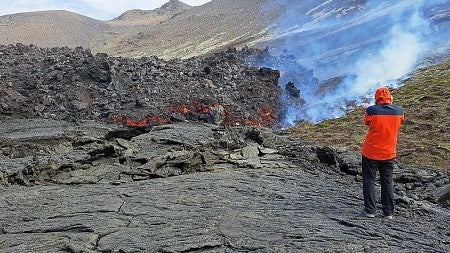Earth science applies the basic sciences of physics, biology, chemistry, and mathematics to understanding processes that have shaped the earth through the last 4.5 billion years. Here at the UO, we are well positioned to study these processes using the natural laboratory found in Oregon, where subduction drives volcanoes and earthquakes, which uplift mountains and inspire surface processes of erosion and deposition. These in turn have in turn fostered an unparalleled fossil record of the age of mammals.

What's Beneath Europa's Icy Surface?
NASA's Europa Clipper spacecraft is on its way to Jupiter's moon. What happens next? Discover how CAS space physicist Carol Paty helped develop key instruments aboard the craft, and learn more about the mission.
What You Can Do with a Degree in Earth Sciences
Students who graduate with a Bachelor of Science degree in Earth sciences are qualified for careers as laboratory technicians, professional geologists, geophysicists, or geochemists. They can find employment in a wide range of fields, including:
- Resource management
- Geotechnical and environmental consulting
- Urban and rural planning
- Petroleum and mining industries
- State and federal agencies such as the USGS, USFS, NOAA, EPA, and DEQ
- Teaching in K-12 schools

Community Resilience
The Oregon Hazards Lab (OHAZ) and the Cascadia Region Earthquake Science Center (CRESCENT) use science and technology to improve statewide resilience to geologic hazards. OHAZ is building an advanced sensor network that detects natural disasters as they emerge, while CRESCENT works with scientists and communities from across the country to improve our understanding of the Cascadia Subduction Zone.
Our Degree Programs
Earth science at the University of Oregon includes the study of geology, oceanography, paleontology, and geophysics. These studies are inherently interdisciplinary, drawing on the knowledge and techniques of other physical and natural sciences such as biology, chemistry, mathematics, and physics.

Learn from Experts in the Field
Our faculty conduct numerous individual and collaborative studies that take advantage of our proximity to the Cascade volcanoes and the tectonic complexity of the western North American margin. Many of our projects are funded by the National Science Foundation, NASA, and the US Geological Survey.

Get Real-world Experience
Students in the Department of Earth Sciences can get their hands dirty through a wide range of hands-on learning opportunities, including multiple two-week field camps each summer term. With the field camp, students gain practical experience applying their Earth science knowledge in the field while exploring wildlands in Oregon and the broader American West.
Scholarships and Funding
Undergraduate students can seek funding through the College of Arts and Sciences, which awards various scholarships to both incoming students and those who are already attending the UO. The Department of Earth Sciences awards annual scholarships to undergraduate students and offers graduate employee appointments to help fund graduate students while pursuing their degree.
Academic Support
Students in the Department of Earth Sciences can seek support from our faculty advisors or from the academic and career advisors in Tykeson Hall. Tykeson advisors can assist with career and course planning; answer questions about core education requirements as well as university policies and procedures; and connect students with other resources for success.




